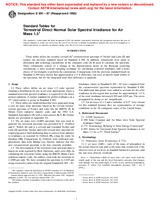Potrebujeme váš súhlas na využitie jednotlivých dát, aby sa vám okrem iného mohli ukazovať informácie týkajúce sa vašich záujmov. Súhlas udelíte kliknutím na tlačidlo „OK“.
ASTM E891-87(1992)
Tables for Terrestrial Direct Normal Solar Spectral Irradiance Tables for Air Mass 1.5 (Withdrawn 1999)
Automaticky preložený názov:
Stoly pre pozemné Direct Normal Solárne spektrálna ožiarenia stoly Air Mass 1,5 ( Withdrawn 1999 )
NORMA vydaná dňa 1.1.1992
Informácie o norme:
Označenie normy: ASTM E891-87(1992)
Poznámka: NEPLATNÁ
Dátum vydania normy: 1.1.1992
Kód tovaru: NS-48385
Počet strán: 6
Približná hmotnosť: 18 g (0.04 libier)
Krajina: Americká technická norma
Kategória: Technické normy ASTM
Anotácia textu normy ASTM E891-87(1992) :
Keywords:
Air mass, Irradiance/irradiation-solar, Reflectance and reflectivity-solar devices, Solar collectors, Solar spectral irradiance, Tables (measurement), Transmittance and reflectance-solar devices, Wavelength, terrestrial direct normal solar spectral irradiance for air mass, 1.5-tables, ICS Number Code 27.160 (Solar energy engineering)
Doplňujúce informácie
| 1. Scope |
|
1.1 These tables define an air mass 1.5 solar spectral irradiance distribution for use in all solar applications where a standard terrestrial spectral irradiance is required for the direct normal radiation. A similar standard for global irradiance on a 37° tilted surface is given in Standard E892. 1.2 These tables are modeled data that were generated using a zero air mass solar spectrum based on the revised extraterrestrial spectrum of Neckel and Labs (1), the BRITE (3, 4) Monte Carlo radiative transfer code, and the 1962 U.S. Standard Atmosphere (5) with a rural aerosol (6, 7, 8). Further details are presented in Appendix XI. 1.3 The air mass zero (AM0) spectrum that was used to generate the terrestrial spectrum was provided by C. Frohlich and C. Wehrli (1) and is a revised and extended Neckel and Labs (2) spectrum. Neckel and Labs revised their spectrum by employing newer limb-darkening data to convert from radiance to irradiance, as reported by Frohlich (9), citing the study by Hardrop (10). Comparisons by Frohlich with calibrated sunphotometer data from Mauna Loa, Hawaii, indicate that this new extraterrestrial spectrum is the best currently available. 1.4 The development of the terrestrial solar spectrum data is based on work reported by Bird, Hulstrom, and Lewis (11). In computing the terrestrial values using the BRITE Monte Carlo radiation transfer code, the authors cited took the iterations to 2.4500 [mu]m only. We have extended the spectrum to 4.045 [mu]m using sixteen E[lambda]i values from the original Standard E891-82. Irradiance values in Standard E891-82 were computed from the extraterrestrial spectrum represented by Standard E490. The additional data points were added to account for the solar irradiance in this region that account for approximately 1.5% of the total irradiance between 0.305 and 4.045 [mu]m. The errors propagated by doing so are insignificant. 1.5 An air mass of 1.5 and a turbidity of 0.27 were chosen for this standard because they are representative of average conditions in the 48 contiguous states of the United States. |
Odporúčame:
Aktualizácia technických noriem
Chcete mať istotu, že používate len platné technické normy?
Ponúkame Vám riešenie, ktoré Vám zaistí mesačný prehľad o aktuálnosti noriem, ktoré používate.
Chcete vedieť viac informácií ? Pozrite sa na túto stránku.




 Cookies
Cookies
